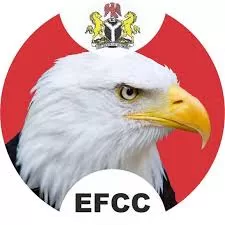
PRESSURE MOUNTS ON SUPREME COURT AS 16 GOVERNORS SUE EFCC
On October 22, just days away, the Supreme Court would be hearing a suit filed by no fewer than 16 state governments challenging the constitutionality of the laws establishing the Economic and Financial Crimes Commission (EFCC) and two other anti-graft agencies.
Now, all eyes have shifted to the Supreme Court, which to be fair, has in the matter of local government autonomy, showed a radical bent to strengthen the weak ligaments holding the nation’s democratic structure. Nigerians expect such uncompromising judicial exposition in the instant case challenging the legality of EFCC and other agencies.
On face value, Nigerians should wholly welcome the establishment of anti-corruption agencies like the EFCC, which was established in 2003 via an Act of parliament and became operational in 2004. But activities of the EFCC and other anti-graft agencies have continued to tend towards promoting corruption rather than mitigating it. Till this day, EFCC is largely perceived as a witch-hunt tool in the hands of those in power, especially the sitting president at any given time.
Worst of it all, neither the EFCC nor ICPC and others has, in real terms, advanced the fight against corruption. Despite the preponderance of these anti-corruption laws in the country, Nigeria continues to rank high in the global corruption index. Currently, Nigeria ranks 145 out of 180 countries, meaning she is among the ignoble class of most corrupt nations.
Nigeria ranked high before the EFCC Act and has continued to rank high a good two decades later. Many lawyers, scholars and laymen have advanced reasons why corruption thrives in the country despite the existence of EFCC. To some, EFCC is itself a nest of corruption that needs to be dismantled structurally to make it efficient.
For others, the EFCC operates illegally having been cobbled hurriedly against the grains of the Nigeria Constitution. Yet, to some, the Act setting up the EFCC needs to be reworked to conform to due process and basic fundamentals and requirements of law-making in a federation with federating units (the states). This category of persons argues that EFCC Act was foisted on the people without input from State Assemblies.
It was no surprise, therefore, that no fewer than 16 state governments (with prospects of more state governments joining) have approached the Supreme Court for adjudication on whether the enactment of the EFCC Act followed due process as required by the Constitution.
Already, a seven-member panel led by Justice Uwani Abba-Aji has commenced action on the suit by fixing October 22 as the date for hearing. This was after the states were joined as co-plaintiffs and leave consequently granted for consolidation of the case.
The suit was originally filed by Kogi State government through its Attorney General (AG), but it has turned out a trigger because it encouraged other states to step out to challenge the legality of the anti-graft body.
Members, violated section 23 (3) CBN Act, among other infringements on citizens’ rights. At the end, the Supreme Court restored sanity in the system by not extending the validity of the old naira notes as legal tender but also ruling that both the old and new notes should co-exist as valid legal tenders. The state governments won, a victory widely celebrated by Nigerians.
The extant state governments’ case against the constitutionality of the EFCC and others represents another milestone that would strengthen or weaken the democratic foundation of Nigeria as a true Federation. This explains the excitement and the reason why all eyes are rivetted towards the wise seven-member panel of the Supreme Court starting from October 22. It promises to be another legal firework that would test the independence, integrity and courage of the judiciary, in this case the Supreme Court.
Every right-thinking Nigerian should salute the courage of the 16 state governments who have taken it upon themselves to test our laws, and by that very act, help to deepen the nation’s democracy.
https://dailytrust.com/illegality-of-efcc-all-eyes-on-the-supreme-court/

